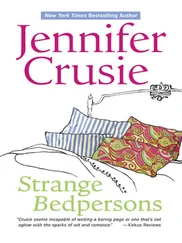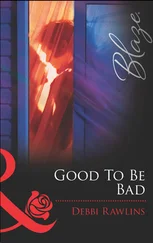“Forget it,” my father pronounced over the table. He’d been gone for six months by then: relocated to a new suburb, living in a brand-new, shiny condo with a brand-new shiny girlfriend. He’d agreed to meet us for dinner, then cancelled and rescheduled twice. “I’m not sending you to some dyke school.”
“Larry,” said my mother, her voice quiet and hopeless. All of her good humor and cheer had been leeched from her by then. It would be years – and Tayna – before she laughed and smiled easily.
My father ignored her, glaring at me suspiciously, a forkful of steak raised halfway to his mouth. “You aren’t a dyke, are you?”
“No, Dad,” I said, “I actually prefer threesomes.”
He chewed. Swallowed. Patted his lips with his napkin. “That’s two more people than I’d have thought would be interested in seeing you naked,” he said.
As much as I’d liked Smith, I hadn’t liked Princeton. The campus looked like the staging ground for a very successful eugenics experiment: everyone was blond, preppy, and perfect, except for the dark-haired girls who were sleek, exotic, and perfect. During the weekend I’d spent there I hadn’t seen a single fat person, or anyone with bad skin. Just acres of shiny hair, straight white teeth, and perfect bodies in perfect clothes arrayed beneath the perfect willow trees that grew beneath perfectly Gothic stone halls.
I said I’d be miserable. My father said he didn’t care. I dug my heels in. He told me it was Princeton or nothing. And by the time I’d been packed off to Campbell Hall and stayed long enough to start classes and have my graduation-present mountain bike stolen from the library bicycle rack, the divorce was final, and he was gone for good, sticking us with a tuition bill of which he’d paid just enough to make it impractical for me to start over anywhere else. So I quit the crew team – no big loss to me, or the team, I suspect, since I’d gained the requisite Freshman Fifteen, plus the fifteen pounds my roommate should have gained but didn’t, thanks to her diligent bulimia – and got a job with the Department of Food Services, affectionately known as Doofus to its employees.
If college is supposed to be the best years of your life, then it’s safe to say that I spent the best years of my life in a hairnet, dishing out reconstituted scrambled eggs and limp bacon, loading dirty dishes on the conveyor belt, mopping the floors, looking at my classmates out of the corner of my eyes and thinking that they were all so much more beautiful, graceful, comfortable in their own skins than I could ever be. They all had better haircuts. And all of them were thin. True, many of them were thin because they were sticking their fingers down their throats after every meal, but at times that seemed like a small price to pay for having basically everything a woman could want – brains, beauty, and a way to eat ice cream and cherry Danishes and still stay skinny.
“Good Hair” was the first article I wrote for the campus alternative newspaper. I was a freshman, and the editor-in-chief, a junior named Gretel whose own hair was kept in a paramilitary blond brush cut, asked me to write more. By sophomore year I was a columnist. By junior year I was a senior writer, spending every hour I wasn’t slinging hash or pushing a mop in the Nassau Weekly’s cramped, dusty offices in Aaron Burr Hall, and I’d decided that this was what I wanted to do with my life.
Writing let me escape. It let me escape Princeton, where everyone was chic and stylish and, in the case of the guy down the hall, the future ruler of some minor Middle Eastern principality. It let me escape the insistent tug of my family, and its ongoing misery. Writing was like slipping into the ocean, a place where I could move easily, where I could be graceful, and playful, and invisible and visible all at once – a byline, not a body. Sitting in front of the computer, with the screen blank and the cursor blinking, was the best escape I knew.
And there was plenty to escape from. In the four years I was at Princeton, my father remarried and had two more children. Daniel and Rebecca. He had the nerve to send me pictures, and birth announcements. Did he think I’d be happy, seeing their squinched-up baby faces and tiny baby footprints? It felt like being kicked. It wasn’t that he didn’t want children, I realized sadly. It was that he hadn’t wanted us.
My mother went back to work, and her weekly telephone calls were full of complaints about how schools, and kids, had changed since she got her teaching certificate. The subtext was clear: This wasn’t the life she signed up for. This wasn’t where she expected to be, at fifty, making ends meet on alimony and what the local school board paid permanent substitutes.
Meanwhile, Lucy had flunked out of her first year at school in Boston, and was living at home, attending community college haphazardly, and majoring in unsuitable men. Josh was spending three hours a day in the gym, lifting weights so frequently that his upper body looked inflated, and had pretty much stopped talking except for a series of tonal grunts and the occasional “Whatever.” “Just get your education,” my mother would say wearily, after the latest recitation of how my father’s checks were late again, of how her car had broken down, of how my sister hadn’t come home for two nights in a row. “Just finish up. We’ll be fine.”
Then – finally – it was the June of my graduation.
Except for a handful of strained lunches during the summer and Christmas breaks, I hadn’t seen my father. He sent birthday cards (usually on time), and tuition checks (almost always late) and usually for about half of what they were supposed to be. I felt like I’d become just one more unremarkable item on his to-do list. I hadn’t expected him to come to my graduation. I never thought he’d care. But he called me a week in advance of the much-longed-for date, saying that he was looking forward to it. Him, and his new wife, whom I’d never met.
“I’m not sure… I don’t think…,” I stammered.
“Cannie,” he said. “I’m your father. And Christine’s never seen Princeton!”
“So tell Christine you’ll send her a postcard,” my mother said sourly. I had dreaded telling my mother that he’d be there, but I couldn’t figure out how to tell him no. He’d said the magic words, the pellet words. I’m your father. After everything – his distance, his desertion, the new wife and new kids – I was, it seems, still starving for his love.
My father, with new wife and kids in tow, arrived during the English Department’s reception. I’d won some small award for creative writing, but they came too late to hear my name called. Christine was a petite little thing, with an aerobicized hard body and a blond perm. The children were adorable. My floral Laura Ashley dress had looked just fine in the dorm. Now it looked like a slipcover, I thought dismally. And I looked like a sofa.
“Cannie,” said my father, looking me up and down. “I see college cuisine’s agreed with you.”
I clutched my stupid plaque tightly against me. “Thanks so much,” I said. My father rolled his eyes at his new wife as if to say, Can you believe how touchy she is?
“I was just teasing you,” he said, as his new adorable children stared at me, as if I were an animal in a zoo for the oversized.
“I, um, got you tickets for the ceremony.” I didn’t mention that I’d had to beg, borrow, and finally pay $100 I couldn’t spare to score the tickets. Each senior was issued a total of four. The administration at Princeton hadn’t yet made accomodations for those of us struggling with reconstructed families that included stepmothers, stepfathers, new half-siblings, and the like.
My father shook his head. “Won’t be necessary. We’re leaving in the morning.”
Читать дальше












